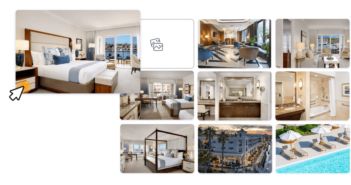You’re scaring travellers from making direct hotel bookings: Here’s a couple ways you can fix that.
There’s your Bed & Breakfast. Then, the self-serviced accommodations down the road. There’s also that retrofitted factory-hotel in the east end. And you all have one thing in common. You’re vying for the traveller’s accommodation dollars.
Back in the day, that wasn’t so bad. Heck, you have the nicest looking place in town, white-picket fence and all. But it’s different today. People are looking and booking online now more than they are visiting brick and mortar travel agencies. Walk-ins are decreasing, too. In some countries, more than half of all travel bookings are now made online. And it’s only going to go up from here. You know this. But why is it happening and what can you do to get more direct hotel bookings?
Travellers crave the control and assurance that advancements in consumer-tech provide them in their daily lives. Why should travel arrangements be any different? To find this control conveniently, they are turning to the Internet- in droves. Let’s call this transition the digital booking shift.
Nowadays, the number of occupants you enjoy increasingly corresponds to your online exposure. It should come as little surprise either. More and more travellers are consulting the Internet to find their ideal hotel. And that curb appeal that your hotel sports, white picket fence and all, needs to translate online in the form of a high-quality planning and booking experience.
View this digital booking shift as your biggest opportunity. There are numerous hotels who have yet to recognize it. If they wait too long, they’ll be left in the dust of the foot traffic of yesteryear.
Don’t join them. Instead, use these tips to differentiate yourself from them and remain the most attractive hotel in town.
You need to look legitimate: do that with consistent and attractive imagery
According to Hubspot, a leader in developing inbound marketing software, ‘’…content with relevant images gets 94% more views than content without relevant images.’’
So, what’s relevant?
Images that clearly show your hotel exterior, interior rooms, and amenities are the most relevant. It’s best to have just a few, high-quality images of each room type instead of 10 junky ones. These images should take top priority on your hotel website and digital assets (hotel profiles, and social media accounts). And you’ll want to add these to your booking engine.
When shopping around for a high-quality booking engine, focus on your ability to integrate this imagery as much as considering the actual ease of booking. Decent booking engines will provide an intuitive interface where you can incorporate images for each room type and amenity.
Next, you’ll want to consider the actual design and customizable interface of the booking engine. Is the overall look one that fits your brand? Is it clean and simple in style? Does it let you edit the color to take on your brand’s palette? If you’re not answering yes to each of these, it’s time to look at another booking engine.
Work with a high-quality booking engine to generate more direct hotel bookings
Now, if you have the visuals down pat, you need to ensure that the booking process is simple and intuitive as well. Many hoteliers assume that a link to a calendar and email-connected reservation process is sufficient. It’s not.
Nowadays, people can book a hotel in seconds through a range of online travel agents (OTAs). If you’d prefer to increase the number of direct hotel bookings that you receive, you need to offer at the very least a similar booking experience. People want to know right away that they have a place to stay. They want control of their booking. They don’t want to have to guess if the reservation was successful or wait for you to answer their email. Every minute of delay is a moment they spend considering other accommodation options.
Here are the four criteria to consider in delivering a quality booking experience on while driving more direct traffic. If you do not yet have a booking engine integrated on your site, evaluate potential providers based on their ability to do the following.
1. Availability should be updated live
When you utilize a quality booking engine your room availability is instantly updated every time you receive direct hotel bookings. This saves you, the hotel manager, a lot of time as you no longer have to manually track guest arrivals with paper and pen. It’s also a lot more accurate.
By having your availability correctly displayed online, guests know right away if your hotel can accommodate their dates. This gives them control to plan accordingly and encourages them to book direct as they have little need to investigate your availability elsewhere.
2. Ease of booking is key
When potential guests find your website, they need to search room type, rates, and dates with ease. As such, your booking engine has to be prominent. Place it on or near the main page of your website or under a menu header that is intuitive. Something along the lines of Book a Stay, Reserve Now, or Check Availability will do.
Also, the booking engine needs to display your room availability, rates and dates in an easy to read fashion. It should be simple to navigate and to operate. If you’re not yet sure what you want in your booking engine, take a look at those used by OTAs, competing hotels, and other accommodations sites.
Study how many clicks it takes to go from just looking to direct booking. Naturally, less it more.
3. Rates should be tailored for a global audience
Since potential guests are planning and booking their travel online, the ability for you to reach a global audience is greater than ever before. To connect with them directly, and prompt more bookings through your website, you need to have a smart booking engine tailored to their country of origin.
Reputable booking engines are able to accommodate a variety of currencies and languages. When shopping around for one, check and see if it can handle multiple currencies and languages. Prioritize those associated with your global target audience first. Typically, engines that host pounds, euros, and USD are a good place to start. Make sure to check the conversions to ensure your rates appear correctly for each.
To increase ease of booking for your guests, make sure your booking solution powers direct bookings through your website. Customer’s shouldn’t be re-directed to third party payment sites. If they are, this reduces the perception of security and control with their booking. It may also increase potential discrepancies.
4. Connectivity is king
When your booking engine works with your channel manager, your room inventory updates instantly. In turn, this helps prevent overbooking. Not all booking engines have this capacity so you’ll want to look into it specifically.
With smart technology that speaks to each other you save yourself time, your guests’ hassle, and encourage a positive experience right from the start. Booking engines that provide connectivity options for complete channel management also empower hotel managers like yourself to achieve direct hotel bookings from channels beyond your hotel website.
How cool would it be for you to start collecting bookings through social media and hotel metasearch and not have to manually update your availability on each channel? It’s possible when you use a quality booking engine that integrates seamlessly with your other tools.
Compete with booking channels




